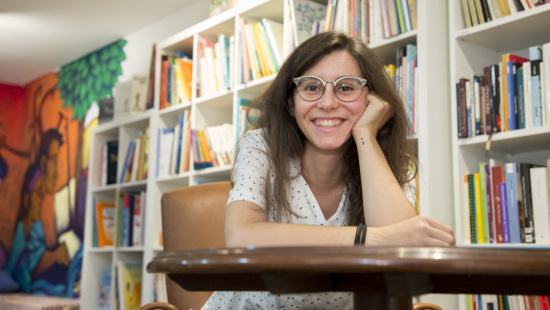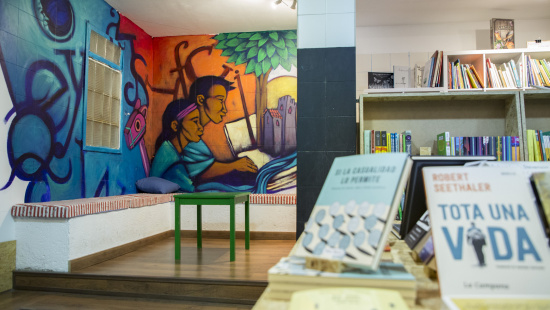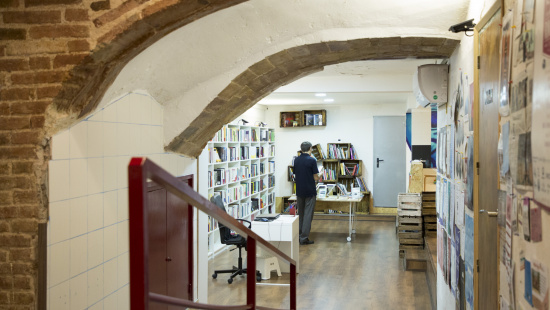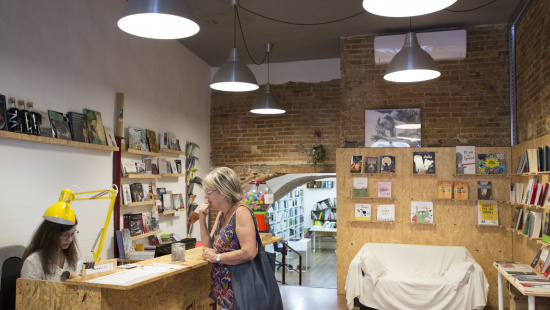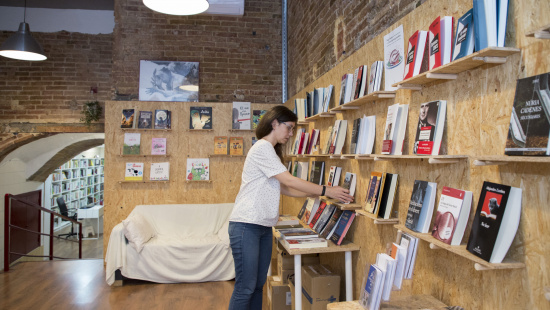Books and local residents get together at ‘La Carbonera’
When
2/10/2018
“Open days? We’re opening our arms! Everyone who’s knocked at the bookshop’s door, we've told them to come over and do things with us.”. So says Carlota Freixenet, who, along with Mar Redondo and Aitor Moreno, is part of the cooperative that runs the bookshop in Poblesec 'La Carbonera' (C/ Blai, 40). All three first met at the “Literal” fair dedicated to radical ideas and books. The things they agreed on and their shared aspirations led to the idea of creating a professional project together in the form of a bookshop. Its first anniversary is on 28 October this year.
Since the street that ‘La Carbonera’ is located on is fully pedestrianised, it is packed with people walking up and down. It is named after the coal depot that originally occupied the premises and stands out among the street's many bars and restaurants, most of which compete to attract customers with a surprising variety of tapas displayed on their counters. “Local residents were very happy when we told them we’d be opening a bookshop, as they’d assumed it was going to be another bar”, Carlota points out, explaining how they chose the neighbourhood because it had been in need of a bookshop for some time, for over twenty years in fact.
As soon as they’d opened to the public, they began to build their relations with the neighbourhood: with the local Diables [devil fire-runners] and Castellers [human-tower groups] and civic centres, and with other cooperatives such as the Raposa bookshop and the Lleteria [an ecological food shop], the Som Paral·lel platform, the Poblesec historical research centre and, of course, the local libraries, which are the Biblioteca Sant Antoni-Joan Oliver and the Biblioteca ‘Francesc Boix’, which is just a stone's throw away and with which they currently share a book club. In fact, the Castellers, as Carlota explains, have already made the bookshop their meeting point. Involvement.
Engaging in the "Commerce and Schools” project
In the Blai, 40 premises the bookshop opens up to local residents so they can hold discussions and debates on the neighbourhood, Mar remarks. They are also building relations with schools and receiving visits from their students, young children and teenagers alike. They have also signed up to the “Commerce and Schools” project for the current school year, a project that invites children to discover the city through its local shops.
With growth, the moment usually comes when it's time to spread your wings. And that is just what they have done. They’ll be making their new launch at the Sala Apolo, on 4 October, where they've organised a presentation of Aleix Salvans’ book “Managing chaos”, in Sala 3. 'La Carbonera' may be small in size but its horizons extend to the other side of El Paral·lel.
Crossing over to the other side of the avenue, whether from Sant Antoni or Poblesec, is a small yet significant step. And that is because it debunks the Barcelona stereotype of the distant relationship between the two neighbourhoods.
A poetry "ring"
Over the course of the year, ‘La Carbonera' organises activities on a weekly basis, some of which are literary presentations, others readings promoted by the various clubs that have opened and some which even take the leap into prose. A few months ago the bookshop organised a lively poetry “ring”, which attracted a large number of people. Feminism is the main thread in many of the activities. By conviction, as Carlota and Mar point out.
As for books sold, they have discovered that children’s books sell more regularly than they thought, that short stories carry more weight than essays and that poetry awakens more interest than they imagined.
They are now putting the final touches to the preparations for the activities planned for the coming months. There will be no shortage of Sunday aperitifs, which are on their way to becoming a “classic” and they really pull in the crowds. Mar says that the authors they invite for Sunday mornings are very happy to take part, possibly because Sunday mornings are such a great time for relaxation. Mondays, which are traditionally hard for business, are when the bookshop is closed. This is strategy that works for them, based on their understanding that a bookshop is much more than a space for selling books, that it is a place where culture, in all its forms, plays a central role.


